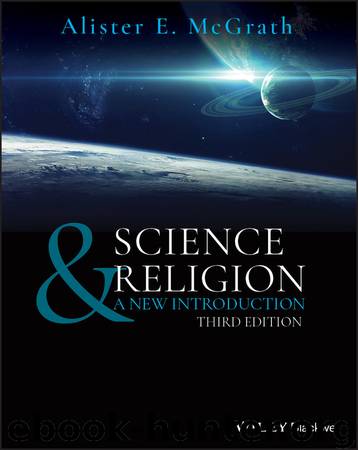Science & Religion by Alister E. McGrath

Author:Alister E. McGrath
Language: eng
Format: epub
ISBN: 9781119599869
Publisher: Wiley
Published: 2020-02-14T00:00:00+00:00
Quantum Theory: God Acts Through Indeterminacy
A fourth approach has emerged as significant more recently, largely as a result of the ‘Scientific Perspectives on Divine Action’ programme, noted earlier. The three approaches just outlined are widely encountered in theological and philosophical discussions of divine agency. In recent years, however, these have been supplemented by other approaches. Although these more recent understandings of divine agency have yet to gain a wide degree of acceptance, they are of sufficient interest and importance to mention here.
One approach, based on the Copenhagen model of quantum mechanics, holds that the idea of indeterminancy offers a way of thinking about God's actions in the world. Events which might seem to occur randomly are actually caused by divine agency. The appeal of the approach is obvious. Most philosophers want to affirm that any belief in real freedom in agents, whether human or divine, requires an open future, rather than one which is predetermined. The Copenhagen approach to quantum mechanics incorporates such a notion of indeterminacy, thus suggesting that divine agency can operate without detection or interference in the autonomy of natural (particularly living) entities. God is thus the ‘determiner of indeterminacies’.
This approach is adopted by Robert John Russell in his NIODA (non‐interventionist objective divine action) proposal, developed as part of the ‘Scientific Perspectives on Divine Action’ programme. Russell is specifically concerned about whether God can be said to act objectively in nature while avoiding violation of the laws of nature. Russell argues that God's special action ‘results in specific, objective consequences in nature, consequences which would not have resulted without God's special action.’ Although this might seem to appeal to a ‘God of the gaps’ framework, Russell argues that this is not the case. God has created the world in such a way that God is able to act in special ways without intervening in the flow of natural processes. Physical processes are open to God's direction or influence because God created them this way. ‘God creates the universe such that the quantum events occur without sufficient natural causes and acts within these natural processes and together with natural causes to bring them about.’
Yet there are problems with this potentially attractive position. Even if an indeterminist approach to quantum theory is favoured, critics such as Jeffrey Koperski have argued that the theological outcome of such a strategy is close to deism. The indeterminist Copenhagen interpretation of quantum theory may well be dominant; yet others – such as that developed by David Bohm – are determinist and seem to offer no such indeterminate quantum nexus as a means of safeguarding the idea of divine agency. Nor is there any indication that quantum fluctuations could have the cumulative force necessary to speaking meaningfully of God ‘acting’ in the world.
One of the issues that is significant in discussion of divine action concerns the status of the notion of the ‘laws of nature’. Are these to be seen as inviolable principles governing the processes within the universe? Or simply as summaries of
Download
This site does not store any files on its server. We only index and link to content provided by other sites. Please contact the content providers to delete copyright contents if any and email us, we'll remove relevant links or contents immediately.
The Lost Art of Listening by Michael P. Nichols(6472)
Why I Am Not A Calvinist by Dr. Peter S. Ruckman(3770)
The Rosicrucians by Christopher McIntosh(3049)
Wicca: a guide for the solitary practitioner by Scott Cunningham(2704)
Signature in the Cell: DNA and the Evidence for Intelligent Design by Stephen C. Meyer(2501)
Real Sex by Lauren F. Winner(2474)
The Holy Spirit by Billy Graham(2417)
To Light a Sacred Flame by Silver RavenWolf(2353)
The End of Faith by Sam Harris(2289)
The Gnostic Gospels by Pagels Elaine(2026)
Nine Parts of Desire by Geraldine Brooks(2006)
Waking Up by Sam Harris(1958)
Heavens on Earth by Michael Shermer(1955)
Devil, The by Almond Philip C(1899)
Jesus by Paul Johnson(1887)
The God delusion by Richard Dawkins(1848)
Kundalini by Gopi Krishna(1824)
Chosen by God by R. C. Sproul(1760)
The Nature of Consciousness by Rupert Spira(1689)
